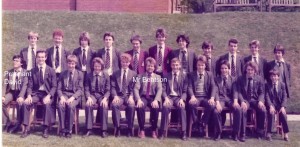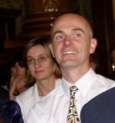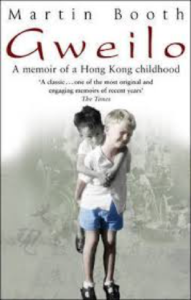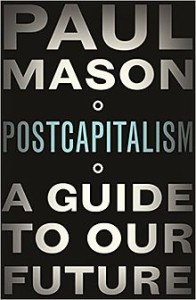
Two days ago my friend David MacKay died. We went to school together in Newcastle-under-Lyme between 1981 and 1985 and sat almost the same ‘O’ levels and ‘A’ levels. We were born one day, and one continent apart, and our lives seemed to dance around one another’s, always slightly out of phase but broadly in the same direction. We were friends, and to the extent such terms can be used to describe relationships between two prickly, competitive, teenage loners, briefly best friends at school. He wasn’t the easiest person to be friends with. He wasn’t so much socially awkward as socially absent; I don’t recall him ever coming to any student discos, parties, gigs or the pub. The only time we did anything together outside of school was when we went to the preacher Billy Graham’s football pitch-scale sermon in Liverpool. David went because of his Christianity, and I out of curiosity. He of course excelled academically, but he also a good musician and a useful hockey player. I believe he had an austere home life, his parents were much older than anyone else’s, and they didn’t much care for frivolities like TV which were banned from his home. The photo above was our 6th form science class, led by by our inspiring form teacher Mr Beatson.
After school I went to Oxford and he to Cambridge. We didn’t much keep in touch. After his PhD at Caltech in US I visited him once or twice at his college. When we met I was surprised by our enduring similarities in tastes: we both enjoyed our Brompton bikes, our Psion organisers and our Raspberry Pis.
He had started dabbling in energy issues which were a bit of a diversion from his usual academic fare of information theory and machine learning. He was always incredibly modest about his achievements but I understand (but not from him) he had helped correct optical defects in the Hubble telescope algorithmically. By then I was working as Government economist on environment and climate change issues. We were both planning to write books on energy and climate change. We talked a few times about our respective projects and the gulf in our thinking was already evident. His Sustainable Energy was published in 2008, and I my Economical Environmentalist in 2009. We both mention each other in our acknowledgements, but I suspect neither much cared for the other’s book.
To me it was the Without Hot Air bit of the book that irked. The “Hot Air” of political discussion is necessary to align consumers, institutional investors and businesses. In Western countries (less so here in the East) it renders energy policy more than an arithmetic problem of balancing supply and demand. And amidst the book’s many useful facts and intuitions, there were also many niggling assumptions that betrayed David’s prejudices. We exchanged emails about whether he was being fair in his dismissal of combined heat and power (an area of policy I was then working on), his espousal of nuclear despite the clearly understated costs of the new reactor design evident even back when David wrote the book, and his overly simplistic caricature about wind power gobbling up an area the size of Wales. But he didn’t respond to my comments. But the book was well written, and revealed David’s excellent and seemingly effortless skills of simplifying and communicating. More importantly it sold by the bucket-load and has proved influential.

David at Maya’s and my wedding
David came to Maya’s and my wedding a few months after Sustainable Energy was published. But we didn’t communicate again until David was considering and being considered for the role of Decc Chief scientist. I told him while he had an excellent chance of getting the job, it would frustrate him. David’s clearly defined and often inflexible views of the world, were at odds in the nuanced and slow to change world of Whitehall. But I knew he desperately wanted to bring scientific rationality into energy policy making, so it was inevitable he would accept. I didn’t much speak to him while he was in that role. I have no idea whether he enjoyed it or not. His team developed a well received carbon calculator that allows people to develop their own energy scenarios. And I am told he retained his kind and patient manner with his staff. I doubt he bears much responsibility for the current mess that constitutes UK’s energy efficiency, and increasingly balkanized renewables policy.
By then I had left the civil service and joined the consumer movement. I was also active on the other side of the environmental fence. I had co-written a second book Repowering Communities featuring case studies and policies to promote locally planned decentralized energy, combined heat and power and energy efficiency. I took part in many working groups and community level actions to try and get these off the ground. Rhetorically Government supported such bottom up initiatives but the financial and policy support for such polices were slowly withdrawn from 2010 onwards. I was very much opposed to the large-scale nuclear, air source heat pump based future that David used to promote, and wanted to halt any further subsidy-junkie, nuclear power stations being built .
For several years we lived only a couple of miles apart on opposite sides of Hampstead Heath. But the only time I saw him after my wedding was the week before he moved back to Cambridge. It was late autumn and my son and I were cycling across Hampstead Heath. Ramesh was pregnant with David’s and her second child. He invited me to his going away event the following weekend. For some reason or other I couldn’t make it. I wish I had. A few months later I had left for Hong Kong.
I have recently been dabbling with data science. Bizarrely, I found myself drawing on his first book on information theory for an analytical problem at work about how to cluster people and draw inferences from the vast amount of sometimes contradictory data from consumer surveys. I was impressed with the lucidity of his explanation and quickly adopted one of his ideas to some work.
For the last few weeks I have been devouring his blog about how his stomach cancer is killing him. With his typical rationality and uncompromising forthrightness, he shared the slow shredding of his life in sleepless pain – researching and commenting on the efficacy or otherwise of each treatment he endured – even taking a side swipe at CHP in one of his final posts. I wish I could have been a better friend to him at school, or tried to make more of an effort to break into his busy schedule when he was in London. I feel so so desperately sorry his two young children, will only ever remember their father, ever so slightly.
When he died we were again in different continents. The night after his death I was overcome with a terrible nausea and pains from a stomach problem that have plagued me on and off for several months. The weird symmetry of our lives, displaced by one day and a continent, haunted me.
But I survived the night and I promised my wife I would go to the doctor’s and get my stomach seen to by specialists on Monday.
 Just finished reading Martin Booth’s autobiographic book, the third of the Gweilo canon I’ve read these past few months. The three books couldn’t be more different. John Lanchester’s novel Fragrant Harbour covers the period between the end of the first world war and the turn of this century. He skilfully weaves three narrators and three narratives into an intergenerational saga. James Clavell’s Taipan is a swashbuckling story of an early Victorian privateer who outwits mandarins, pirates and business rivals to found an enduring business dynasty that loosely based on the Jardine story. Gweilo is set in the two-year stretch of time between 1952 and 1954 as seen through the eyes of the 8 to 10 year-old Booth. Booth’s father is a low ranking civil servant and his mother a vivacious and wise homemaker.
Just finished reading Martin Booth’s autobiographic book, the third of the Gweilo canon I’ve read these past few months. The three books couldn’t be more different. John Lanchester’s novel Fragrant Harbour covers the period between the end of the first world war and the turn of this century. He skilfully weaves three narrators and three narratives into an intergenerational saga. James Clavell’s Taipan is a swashbuckling story of an early Victorian privateer who outwits mandarins, pirates and business rivals to found an enduring business dynasty that loosely based on the Jardine story. Gweilo is set in the two-year stretch of time between 1952 and 1954 as seen through the eyes of the 8 to 10 year-old Booth. Booth’s father is a low ranking civil servant and his mother a vivacious and wise homemaker.


 Mason is best known to Brits as a broadcast journalist on BBC and Channel 4, and as a professional northerner-Trotskyist purveyor of political balance on the interview couch. He has drawn on an eclectic mix of economists, psychologists and futurologists to substantiate his obituary of neo-liberalism.
Mason is best known to Brits as a broadcast journalist on BBC and Channel 4, and as a professional northerner-Trotskyist purveyor of political balance on the interview couch. He has drawn on an eclectic mix of economists, psychologists and futurologists to substantiate his obituary of neo-liberalism.